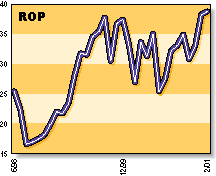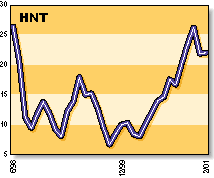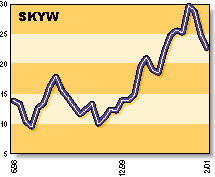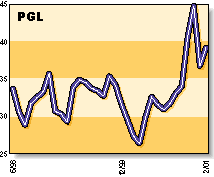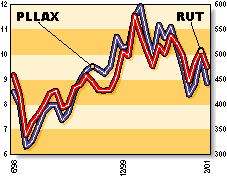
HOT TOPICS LIST
- Strategies
- Stocks
- Buy
- Investing
- Brokers
- Psychology
- Interviews
- Accumulate
- Sell
- Hold
- Spotlight
- Websites
- Candlestick Corner
- Gold & Metals
- Options Trading
LIST OF TOPICS
INTERVIEWS
Tom Morabito of Principal Capital
04/30/01 05:30:52 PM PSTby David Penn
Tom Morabito joined Invista Capital Management, an affiliate of Principal Capital, in early 2000 as the lead small-cap value portfolio manager. Previously, he managed the Structured Small Cap Fund for Invesco Management & Research. Morabito, who received his master's in business administration (MBA) in finance from Northeastern University and his bachelor's degree in economics from State University of New York (SUNY), has more than 12 years of analytic and portfolio management expertise. He is a Chartered Financial Analyst and a member of the Association for Investment Management and Research (AIMR). Working Money Staff Writer David Penn interviewed Tom Morabito via telephone on March 5, 2001.
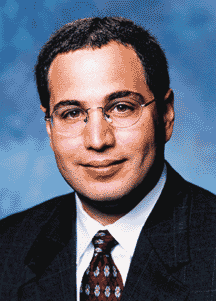 Tom, how did you became involved in finance? I noticed you had an early interest in economics. How does your economics background influence your work as a money manager? It started when I was, believe it or not, 12 or 13 years old. My dad worked as a machinist for American Can Co., which was one of the old Dow 30 companies. He was a union representative for a few years and they used to give him annual and quarterly reports. I'm sure they thought most people would throw them away, but I picked up those reports and started reading them and talking to my dad about how the company was doing. I thought it was fascinating. I would hear him talk about the company and then read about the management involved. I found it was an interesting way to learn about the company where my dad worked and how things worked there. That's how I picked up an interest in finance. When did you start thinking about companies as investments? That grew through time. One of my brothers worked for GTE and another worked for Ryder. A lot of companies were issuing stock to employees back then. I started thinking about different industries and companies, and that initial interest expanded to other areas. I've been a technology buff and a technology analyst for a long time, so that helped as well. You say you have an interest in technology, but when you went to school you got a degree in economics. Why was that? Actually, the school I went to, SUNY Potsdam, didn't offer a minor in computer science. They didn't really have a finance program, but they did have an economics program. Because my dad was in such an economically sensitive industry, I wanted to understand how the economy worked. Think back to the early 1980s. Inflation was high, gold was up to $900 an ounce, and there was certainly an economic slowdown at that time. It was obviously affecting the markets and I wanted to understand that better. Is there a crossover between being an economist and a money manager? I think so. Interpreting the economy clearly plays a role in the way I manage money day to day, and in understanding the general economic cycle and how companies fit into that cycle. Many economists get too focused on the economic level and don't bring that over to how it affects individual companies and industries. It definitely plays a role in what I do, especially with the economic uncertainty these days. I have to dig deep into my training to remember how all these things work. Is there a danger of overthinking money management-type decisions based on your economic background? Are there certain tendencies you have to ward off at times? The one thing you have to remember is that the markets always look forward, and most of the economic data you see is historical. You have to build that bridge and remember that the market is looking out into the future. Maybe it's already focused on the fact that things are slowing down, but you have to look past that. Is that incredible wealth of economic data also a problem for individual investors? Absolutely. One of the big problems many people have is that economic information is delayed to begin with, and, as I mentioned, the stock market tends to look forward. So you have historical information on one side and a forward-looking stock market on the other. You may sell because you see a bad economic number, but the stock market may have already factored that in. Or you may buy too early. In order to participate, you have to fully understand how the two sides interact. Can you give us an idea of what you spend your time doing each day, whether it's conducting your own analytic work, talking with analysts, or dealing with companies? My day starts at about 5:30 am with CNBC, just to see how the overnight markets have done and where the futures are moving. Once I get into the office, I go through all the morning notes. Most nights I get at least three or four overnight calls from analysts; they leave voice mail. I probably speak to four or five analysts a day. Then I browse through the headlines to see if anything major has happened in the world. Sell-side firms are constantly calling, looking for incremental bits of information on one thing or another. We have a pretty good flow of analysts coming through here and we do a number of company visits, as well. I'm meeting with two more companies this afternoon. My job involves constantly evaluating incoming information, processing it all, and seeing how it all fits together. |
| You mentioned talking with four or five analysts a day. That's interesting, because you yourself have an extensive background as an analyst. In talking with them, are you judging what they see compared with what you see, or are you mostly getting a lot of new information from them? I try to have discussions. They usually call about a specific company or issue. Generally, and this depends on the analyst, we'll look at the broad picture and try to determine how what they're saying affects other companies or the entire industry. There is definitely a give and take; we toss ideas back and forth. Sometimes I may call someone and ask, "Hey, what do you think of this?" They either tell me I'm off the wall or that maybe I have an interesting idea. But they all do that for a living. We all need as much input as possible about how things are going, and we need to keep that information flow going. Since you've been an analyst and are now a money manager, do you have any insight on the stereotype of analysts being perpetual bulls? I know that analysts tend to fall in love with the companies they cover. I did it as well, I admit it. But there are companies I would never have considered when I was an analyst. If someone had asked me about these companies, I would have said, "Oh, no, you don't want anything to do with them." The management could have changed, the industry could have changed, but it didn't matter, because I knew the company and that was that. So we all have our subjective biases. Do you think your experience as an analyst gives you an edge in terms of listening to analysts when they're talking about different companies? It does help, because I know the process. It's a process similar to what I went through when I was covering companies. I understand the mindset. There are certain industries where you have to say, for example, "I don't know a lot about the biotech industry, so I'm going to trust my biotech guy a little more than someone else." But most analysts have a level of expertise that goes beyond the average person. You just have to draw that out and make sure that their rationale is valid. At the end of the day, a portfolio manager is really just a judge of all the stories he's heard and what he believes or doesn't believe. That's an interesting way of putting it. What are some things you learn during a company visit that you may not learn from correspondence or talking over the phone? What do you pick up during those visits? When it comes to small-caps, I like to talk to the management. I want to understand their vision and make sure they're focused on what they say they are doing. Many of these companies are one- or two-product companies and there's a lot of pressure on them to diversify. Even though they may be the best producer of a product or service, they are always worried about what will happen if it goes away. They don't really have the resources to broaden. Oftentimes they try, or they start hinting that they're going to try. I want to make sure that they're focused on their product or service and that they deliver value to the shareholders. For small-caps, would you add the lack of a broadly diversified product to the risk equation? I definitely would. I consider small-caps to be the nuts and bolts of the US economy. They are more domestically oriented. For example, Boeing (BA) is the world's largest manufacturer of airplanes, but a lot of the companies I own in my fund feed parts to Boeing. When Boeing sneezes, they all catch a cold, so to speak. Boeing obviously has a fair amount of leverage with them in terms of pricing power. You have a $50 billion company on one side, and on the other side, a $600 million company that provides some key part. There are cases where the management and product depth aren't there or there may be some change in the industry. That adds to the riskiness of the asset class. But small-caps are providing a lot of critical services. Over time, they've been the best-performing asset class. |
| Is it much of an issue for you when you have a small-cap company that is making a predominant amount of its sales to only one larger company or arena? I'm thinking of that Boeing example you gave. That definitely is a factor in determining the valuation and what we're willing to pay for it. If it's a viable product, you have to dig a little deeper and ask: "What product at Boeing is this part going on? How easy is it to produce? Can anybody in the world just stamp out these widgets, or do you have some sort of competitive edge or patent protection or something else that makes you a little more special?" You try to dig deep and find out how good the company's relationship is with Boeing. You find out if there's any contract. You have to factor in all of that. Are there managers who tend to stick with certain types of companies because of their personal inclination or background? Do you think there are managers who are particularly adept at investigating small-caps as opposed to large-cap or micro-cap companies? There are definitely differences between asset classes. In my case, it's just something I enjoy more. I consider it more of a discovery process. As new companies go in and out of the universe, you learn more about how things work, as opposed to something like Boeing or Ibm, where everybody knows what they do. There are companies in the small-cap universe that many people have never heard of. I enjoy that part of the discovery process, which is why I stay in the small end of the spectrum. You work with a partner, John McClain. You're both money managers. How do the two of you work together? Are there areas of strength that complement each other? How does that work? John is actually more of a growth manager and I'm a value manager. We get together. We have an asset allocation decision that we make. We meet fairly regularly, but for the most part, we go our own ways. He controls the growth areas and I control the value areas, in the context of the full portfolio. That's how we build our portfolios. Did you discover your inclinations and management styles in the course of working together, or were your differing approaches the reason for the partnership? That's the reason for the partnership. It's kind of a core product, but we wanted the best of growth and the best of value. That product actually predates me here at Invista Capital Management. I like the way it's run, but I inherited it. When selecting a company, do you look for the company first and then the industry or sector, or is it the other way around? John and I both focus on security selection - building portfolios from the bottom up. We may incorporate some themes into the portfolio, for example, overweighting an area that we think is going to do well, but finding the best stock to add to the portfolio is our primary focus. In the time that you've been a portfolio manager, have you seen common mistakes that average investors make when investing in mutual funds? Have you noticed things over the years that investors need to be more careful about? There are a few things. When you're in this industry, everybody wants a stock tip and has a question for you. Individual investors often forget, and I think I alluded to this earlier, that the market is a forward-looking mechanism. For example, the investors may hear about a product or company that's coming out and say, "That's great, I'm going to buy this stock." It's probable that the market has already built the expectations for that product into the price. When the product actually comes out, it may not be well-received. Maybe the expectations were so high that the stock will actually go down on that news. It's the adage of "buy on the rumor, sell on the news." You forget that the market is forward-looking and that unless you're paying close attention to the current valuation and understand what's built in, it may not be a good time to buy a particular stock. It's similar on the fund side. People tend to chase performance. They forget that every place you see a fund advertised, it says, "Past performance is not indicative of future results." There may have been some short-term reason why a fund did well, as opposed to a long-term positive track record. Very few funds have succeeded through time, and those who have invested in them have been rewarded. But a lot of people chase after short-term performance.
ROP: Roper Industires, a diversified industrial-controls
HNT: HealthNet, an integrated managed-care
SKYW: Sky West provides regional airlines service
PGL: People's Energy, a holding company, manages
PLLAX and RUT: The Principal Small Cap Fund, Class A shares Given some of the ups and downs we had in 2000 and the fact that a lot of the investors in the market now are relatively new and maybe haven't seen too many stiff downturns, do you have any sense of people in general shying away from the market? I haven't seen recent numbers. I definitely think people have shown a lot more resilience than I gave them credit for. Looking back on the last year or so, I thought most people would say, "Gee, we're up a lot and this thing is starting to crack; I'm getting out." Generally, they've been very resilient. During the last couple weeks, equity flows have been negative, so maybe it's starting to get to them now. From your economics background and your perspective as a money manager, what do you think we might see in the markets coming out of spring and heading into the summer? I think the economy has clearly slowed. My guess is by the end of April or going into summer, it will still probably reflect a general slowdown. We're coming off a 10-year expansion, and I think it's going to take more than a month or two to undo that or bring us back to a more normal growth environment. Sometime this summer, we will probably have some level of tax cut, which may or may not ease at least individuals' minds, if not their wallets. I think we'll be looking forward probably to a late 2001, early 2002 recovery, but I don't think we're going into the depths. I don't think we'll have a dramatic slowdown, but I think things aren't going to be as great as they could be. Is there economic news the average investor should be looking at to get some sense of how things are doing? What do you think is worthwhile to pay attention to? Consumer confidence has been the biggest driver of the economy during the last couple years, and it really needs to continue. People have been amazingly resilient, even in the last couple months. We've read about hundreds of thousands of layoffs in the last three months, yet people continue to spend. As long as they remain confident that they're not going to lose their jobs and continue spending, we'll stay out of recession. Not only that, the global economy has become more interrelated, so the business managers' confidence is another major driver. You wouldn't put the fed funds rate in the group of things to watch for? Fed cuts typically take six to nine months to make an impact, so we'll probably start feeling the January cuts in the summer months. I think the rates will be lower in April than they are now. The March cut should be felt in the autumn months, and if there's a May cut, later still. But that depends on how the consumer reacts between now and then and how we chug along. If you were to pin down some things that you enjoy most about managing money, what would they be? You mentioned the discovery process with small-caps and some of the rewards you feel there, but I imagine this could be a stressful job for the wrong person. It is quite stressful, but I'm always trying my hardest, and that makes it a little easier. It's a discovery process. I'm putting together a portfolio based on the way the world is going, or at least the way I think it's going. I try to find good companies and good industries and put them all together in a way that makes sense. It's like putting together a jigsaw puzzle. Were there things about managing money that turned out as you had hoped they would before you were involved? Yes, I think so. I'm happy with what I do. I love it. A lot of people can't say that. Given that I started so young, there certainly was a lot of opportunity for me to have miscalculated. But so far, at least, I really enjoy it. One thing that drew me to this industry is the constant learning. Many people get in some rote job and constantly do the same thing. I'm lucky in that every day is different for me. What about some of the surprises? Are there things you hadn't anticipated? There are always things that are your less-favorite things to do. But overall, it's been great. Maybe one too many meetings a day. Other than that, it has surpassed my expectations. Thank you, Tom, and good luck.
Copyright © 2001 Technical Analysis, Inc. All rights reserved. |
Technical Writer for Technical Analysis of STOCKS & COMMODITIES magazine, Working-Money.com, and Traders.com Advantage.
| Title: | Traders.com Technical Writer |
| Company: | Technical Analysis, Inc. |
| Address: | 4757 California Avenue SW |
| Seattle, WA 98116 | |
| Phone # for sales: | 206 938 0570 |
| Fax: | 206 938 1307 |
| Website: | www.traders.com |
| E-mail address: | DPenn@traders.com |
Traders' Resource Links | |
| Charting the Stock Market: The Wyckoff Method -- Books | |
| Working-Money.com -- Online Trading Services | |
| Traders.com Advantage -- Online Trading Services | |
| Technical Analysis of Stocks & Commodities -- Publications and Newsletters | |
| Working Money, at Working-Money.com -- Publications and Newsletters | |
| Traders.com Advantage -- Publications and Newsletters | |
| Professional Traders Starter Kit -- Software | |
PRINT THIS ARTICLE

Request Information From Our Sponsors
- StockCharts.com, Inc.
- Candle Patterns
- Candlestick Charting Explained
- Intermarket Technical Analysis
- John Murphy on Chart Analysis
- John Murphy's Chart Pattern Recognition
- John Murphy's Market Message
- MurphyExplainsMarketAnalysis-Intermarket Analysis
- MurphyExplainsMarketAnalysis-Visual Analysis
- StockCharts.com
- Technical Analysis of the Financial Markets
- The Visual Investor
- VectorVest, Inc.
- Executive Premier Workshop
- One-Day Options Course
- OptionsPro
- Retirement Income Workshop
- Sure-Fire Trading Systems (VectorVest, Inc.)
- Trading as a Business Workshop
- VectorVest 7 EOD
- VectorVest 7 RealTime/IntraDay
- VectorVest AutoTester
- VectorVest Educational Services
- VectorVest OnLine
- VectorVest Options Analyzer
- VectorVest ProGraphics v6.0
- VectorVest ProTrader 7
- VectorVest RealTime Derby Tool
- VectorVest Simulator
- VectorVest Variator
- VectorVest Watchdog

